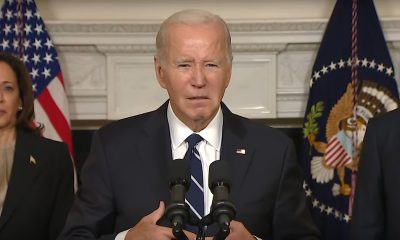National
Supporters bullish about repealing ‘Don’t Ask’
But GOP aide warns ‘minefields’ await

Capitol Hill observers are optimistic that sufficient support now exists to pass standalone “Don’t Ask, Don’t Tell” repeal legislation amid questions about when the Senate will take on the legislation.
A Senate Democratic aide, who spoke to the Blade on condition of anonymity, said the chances of passing the new standalone repeal legislation are “looking better and better each day.”
“Based on what I’m hearing, I think there is a very keen interest by Democratic leaders in the Senate and the House to make a standalone bill a big priority,” the aide said. “I think that they are taking steps to ensure that chances are good for passage.”
Winnie Stachelberg, vice president for external affairs at the Center for American Progress, also said she believes there’s a chance the bill will pass before Congress is out of session.
“Having a chance is all that you need,” she said. “And you need the pieces to fall into place and the commitment of those on the Hill and the White House to get it done. People really need to lean into this to get it done.”
But a Senate Republican aide, who also spoke on condition of anonymity, was more cautious and said passage depends “on so many variables.”
“I think if the omnibus, the continuing resolution, all that stuff stretches past Thursday night, Friday, then it gets real difficult,” the aide said. “Those things are already set in motion. It could happen, but there’s just a lot of minefields.”
Sen. Joseph Lieberman (I-Conn.) introduced the new repeal legislation last week after the Senate on Thursday failed to meet the 60-vote threshold necessary to move major defense budget legislation to the floor containing “Don’t Ask, Don’t Tell” repeal.
Lieberman’s legislation is identical to the “Don’t Ask, Don’t Tell” provision in the fiscal year 2011 defense authorization bill. Even if the standalone is signed into law, repeal wouldn’t take effect until the president, the defense secretary and the chair of the Joint Chiefs of Staff certify the U.S. military is ready to implement open service.
Support for the legislation in the Senate has grown rapidly as Lieberman — and Sen. Susan Collins (R-Maine), an original co-sponsor for the bill — have worked to gather co-sponsors for the legislation. According to the Human Rights Campaign, the measure as of Monday had 40 co-sponsors.
Joe Solmonese, president of HRC, said the growing number of co-sponsors for the legislation “adds momentum” to the effort to legislatively repeal “Don’t Ask, Don’t Tell” this year.
“Now the question is whether the Senate and House will take up this measure quickly and get it to the president’s desk,” Solmonese said. “There should be no excuses for inaction.”
When the bill comes to the floor, eyes will be on senators who say they support repeal, but didn’t vote in favor of bringing the defense legislation to the floor last week, such as Sens. Scott Brown (R-Mass.), Richard Lugar (R-Ind.) and Lisa Murkowksi (R-Alaska).
Last week, many Republicans said they were voting “no” because they didn’t believe the amendment process was fair enough for Republicans. The defense authorization bill typically takes several days of debate and both parties offer amendments to the legislation.
This year, Senate Majority Leader Harry Reid (D-Nev.) had proposed 10 Republican amendments and 5 Democratic amendments as part of the agreement to proceed to the legislation.
But the Republican aide noted that passing “Don’t Ask, Don’t Tell” as standalone legislation as opposed as passing it as part of the defense authorization bill eliminates arguments to vote “no” on procedural grounds.
“You take away everything that people had problems with — procedure, tax cuts and everything else,” the aide said. “It’s a ‘Hail Mary’ pass, but could it work? Yes.”
Stachelberg also said the standalone bill would have a better chance because Republicans wouldn’t be able to say they were being offered an unfair deal for amendments on the larger defense bill.
“We can argue they got that or not with the deal that was offered, but they didn’t feel like they got that,” Stachelberg said. “The process arguments with respect to repeal of ‘Don’t Ask, Don’t Tell’ fall away when you strip out the context of the defense authorization bill.”
As attention remains focused on whether sufficient support exists in the Senate to pass the bill, action is underway in the House to act first to make repeal efforts less complicated in the upper chamber.
On Tuesday, Rep. Patrick Murphy (D-Pa.) introduced companion legislation in the U.S. House. Drew Hammill, spokesperson for U.S. House Speaker Nancy Pelosi (D-Calif.), said a vote on the bill will take place on Wednesday.
The plan was to have a vote in the House and to send the legislation to the Senate as a “privileged” bill, which would allow the Senate to take up the measure without having a cloture vote on the motion to proceed.
The maneuver would skip the 60 votes needed for the motion to proceed with the legislation and shave off the 30 hours of time that is normally needed after cloture is filed to vote on whether to end debate.
Still, even with this plan, the Senate would need 60 votes to proceed to final passage of the legislation.
But the timing for when the Senate would bring up the vote after the House acts remains in question.
Asked if he could offer an estimate for when the Senate would take up repeal legislation, Fred Sainz, HRC’s vice president of communications, replied, “No, my friend, nobody knows that.”
Sources have said Senate Majority Leader Harry Reid (D-Nev.) intends to bring the legislation to the floor before year’s end, but when the bill would come up amid other priorities — such as the START Treaty, a nuclear arms reduction agreement — remains in question.
Jim Manley, a Reid spokesperson, said Monday there’s “nothing to announce yet” on when the bill would come to the floor and said Senate leadership is “still working on next steps for everything we have left to do.”
Some sources say the new repeal legislation could come to the floor as early as this week after the Senate resolves the extension the Bush-era tax cuts, but others say “Don’t Ask, Don’t Tell” would come next week to the floor after additional measures are addressed.
On Monday, White House Press Secretary Robert Gibbs said he believes the START Treaty would come up “soon after” the Senate has finished work on the tax extension plan.
“Obviously it’s unclear yet the number of hours of debate after the procedural vote today before the Senate takes up for final passage of the tax agreement,” he said. “But I think fairly soon after, the Senate will move to the debate on START ratification.”
Still, Gibbs said he thinks “Don’t Ask, Don’t Tell” is part of the “basket of issues” that the Senate will take up before adjourning for the year.
“I think there’s no doubt that based on the votes last week, it’s clear that a majority of the Senate supports the President’s position of doing away with ‘Don’t Ask, Don’t Tell” — repealing that,” Gibbs said. “Certainly our hope is that the Senate will take this up again and it will see this done by the time the year ends.”
The Senate Democratic aide said another attempt to bring up the defense authorization bill — this time with the “Don’t Ask, Don’t Tell” language and other provisions stripped — could come up first for a vote before the standalone repeal bill.
“My strong guess is that the defense bill will have ‘Don’t Ask, Don’t Tell’ and some other sensitive provisions stricken out so that the defense bill could pass fairly easily, and then we could move on to ‘Don’t Ask, Don’t Tell,’ which I think has 60 votes,” the aide said.
National
House Republicans propose steep cuts in federal AIDS budget
Advocacy groups say move would eliminate ‘Ending HIV Epidemic’ initiative

The Republican-controlled U.S. House Subcommittee on Labor, Health, and Human Services, Education, and Related Agencies approved a spending bill on June 26 that calls for cutting at least $419 million from federal AIDS programs that AIDS activists say would have a devastating impact on efforts to greatly reduce the number of new HIV infections by 2030.
The subcommittee’s proposed bill, which includes billions of dollars in cuts in a wide range of other federal health, education, and human services related programs, is scheduled to be considered by the full House Appropriations Committee on July 10. Officials with AIDS advocacy groups say they are hopeful that the full committee, like last year, will refuse to approve the proposed cuts in the AIDS budget.
The proposed GOP cuts would eliminate $214 million from the U.S. Centers for Disease Control and Prevention’s HIV prevention programs, $190 million from the Ryan White HIV/AIDS Program, and $15 million from the Department of Health and Human Services Secretary’s Minority HIV/AIDS Program.
Activists say the impact of those cuts would kill the federal government’s Ending the HIV Epidemic initiative, which among other things, calls for reducing the number of new HIV infections in the U.S. by 75 percent by 2025 and by 90 percent by 2030. The activists point out that ironically the Ending the HIV Epidemic initiative was launched during the administration of President Donald Trump.
“Instead of providing new investments in ending HIV by increasing funding for testing, prevention programs, such as PrEP, and life-saving care and treatment, House Republicans are again choosing to go through a worthless exercise of cutting programs that the American people depend on and will never pass,” said Carl Schmid, executive director of the HIV + Hepatitis Policy Institute.
“While we vigorously fight these cuts, we look forward to working with the entire Congress in a bipartisan fashion on spending bills that can actually become law,” Schmid said in a statement.
Schmid noted that the bill also includes provisions known as “policy riders” that would take away rights and protections from women, such as access to birth control and abortion, and for minorities, including LGBTQ people.
According to a statement released by the office of Rep. Rosa DeLauro (D-Conn.), who is the ranking minority member of the House Appropriations Committee, one of the policy riders would “block the Biden administration’s policies to ensure nondiscrimination on the basis of gender identity and sexual orientation.’ The statement says another policy rider would “prevent policies or programs intended to promote diversity, equality, or inclusion.”
Most political observers believe the Democratic-controlled U.S. Senate would also kill the GOP proposed policy riders and cuts in the AIDS budget if the full Republican-controlled House were to approve the budget bill passed by the appropriations subcommittee.
Rep, Tom Cole (R-Okla.), who serves as chair of the full House Appropriations Committee, released a statement on June 27 defending the subcommittee’s bill and its proposed spending cuts. “The bill provides appropriate and fiscally responsible funding to ensure these departments can continue to perform their core missions while also acknowledging the fiscal realities facing our nation,” he said.
“Importantly, the bill pushes back on the Biden administration’s out-of-touch progressive policy agenda, preventing this White House from finalizing or implementing controversial rules or executive orders,” Cole said in his statement. “It also preserves long standing bipartisan policy provisions protecting the right to life.”
U.S. Supreme Court
Concern over marriage equality in US grows two decades after first Mass. same-sex weddings
Gay and lesbian couples began to marry in Bay State in 2004

Two decades after Massachusetts became the first state to legalize same-sex marriage, a new study reveals both significant progress and ongoing challenges for married LGBTQ couples in the U.S., with a growing sense of insecurity about the future of their rights.
The Williams Institute at UCLA School of Law surveyed 484 married same-sex couples from all 50 states and D.C. The study, released Monday, marks the 20th anniversary of legal same-sex marriage in the U.S.
Researchers found that 93 percent of respondents cited love as a primary reason for marrying, with 75 percent also mentioning legal protections. Over 83 percent reported positive changes in their sense of security, and 74.6 percent noted improved life satisfaction since marrying.
However, the study also highlighted persistent discrimination and growing concerns about the future. About 11 percent of couples who had a wedding reported facing prejudice during the planning process.
Alarmingly, nearly 80 percent of respondents expressed concern about the potential overturning of the 2015 Obergefell v. Hodges decision, which legalized same-sex marriage nationwide. This anxiety has been exacerbated by initiatives like Project 2025, a conservative policy blueprint that some fear could roll back LGBTQ rights if implemented.
The possibility of a former President Donald Trump victory in the upcoming election has further intensified these concerns. Many respondents cited Trump’s previous U.S. Supreme Court appointments and his statements on LGBTQ issues as reasons for their apprehension. One participant stated, “The thought of another Trump presidency keeps me up at night. We’ve come so far, but it feels like our rights could be stripped away at any moment.”
The current political climate has 29 percent of respondents considering moving to another state, with 52.9 percent citing socio-political concerns as a primary reason. This reflects a growing sense of insecurity among LGBTQ couples about their rights and freedoms.
Brad Sears, founding executive director of the Williams Institute, noted, “The data clearly show that marriage equality has had a profound positive impact on same-sex couples and their families. However, it also reveals ongoing challenges and serious concerns about the future of these rights in light of current political trends and the upcoming election.”
Christy Mallory, legal director at the Williams Institute and lead author of the study, added, “This research provides crucial insights into the lived experiences of same-sex couples two decades after marriage equality began in the U.S. The high level of concern about potential loss of rights underscores the continued importance of legal protections and public support for LGBTQ+ equality.”
The study found that 30 percent of surveyed couples have children, with 58.1 percent of those parents reporting that marriage provided more stability for their families. However, many of these families now worry about the security of their legal status in the face of potential policy changes and shifting political landscapes.
As the nation reflects on two decades of marriage equality, the study underscores both the transformative power of legal recognition and the ongoing need for vigilance in protecting LGBTQ+ rights. The findings highlight the complex reality faced by same-sex couples in America today: Celebrating hard-won progress while grappling with uncertainty about the future, particularly in light of upcoming political events and potential shifts in leadership.
State Department
State Department hosts meeting on LGBTQ rights and foreign policy
Event took place before Pride Month reception

Secretary of State Antony Blinken on Thursday hosted a group of LGBTQ activists and politicians from around the world at the State Department.
The event — described as a “Convening on U.S. Foreign Policy: National Security, Inclusive Development, and the Human Rights of LGBTQI+ Persons” — took place before the State Department’s annual Pride Month reception. Participants included:
• Jessica Stern, the special U.S. envoy for the promotion of LGBTQ and intersex rights
• U.S. Ambassador to the U.N. Linda Thomas-Greenfield
• U.S. Trade Representative Katherine Tai
• U.S. Ambassador to India Eric Garcetti
• Suzanne Goldberg, senior advisor to the Under Secretary of State for Civil Security, Democracy, and Human Rights
• Under Secretary of State for Civilian Security, Democracy, and Human Rights Uzra Zeya
• U.S. Agency for International Development Senior LGBTQI+ Coordinator Jay Gilliam
• USAID Counselor Clinton D. White
• National Security Council Senior Director for Democracy and Human Rights Kelly Razzouk
• Assistant U.S. Secretary of Health Adm. Rachel Levine
• National Security Council Human Rights Director Jess Huber
• U.N. Assistant Secretary General for Human Rights Ilze Brandt Kehris
• Icelandic Ambassador to the U.S. Bergdís Ellertsdóttir
• Council for Global Equality Co-Executive Director Mark Bromley
• Outright International Senior Advisor for Global Intersex Rights Kimberly Zieselman
• Essy Adhiambo, executive director of the Institute for Equality and Non Discrimination in Kenya
• Pau González, co-chair of Hombres Trans Panamá and PFLAG-Panamá
“Forty-five years ago, thousands gathered in D.C. in what became the first national march for LGBTQI+, demanding their voices be heard,” said Thomas-Greenfield in a post to her X account that showed her speaking at the event. “We must continue to carry forward the spirit of these pioneers and fight for equal rights and dignity for all.”
Forty-five years ago, thousands gathered in DC in what became the first national march for LGBTQI+, demanding their voices be heard.
We must continue to carry forward the spirit of these pioneers and fight for equal rights and dignity for all. 🏳️🌈🏳️⚧️ pic.twitter.com/oph2Ahmfhq
— Ambassador Linda Thomas-Greenfield (@USAmbUN) June 28, 2024
President Joe Biden in 2021 signed a memo that committed the U.S. to promoting LGBTQ and intersex rights abroad as part of his administration’s overall foreign policy.
“LGBTQI+ rights are human rights,” said Blinken. “Our government has a responsibility to defend them, to promote them — here and everywhere.”
Blinken noted consensual same-sex sexual relations remain criminalized in 64 countries, with the death penalty in 11 of them.
He specifically highlighted Uganda’s Anti-Homosexuality Act and Hungarian Prime Minister Viktor Orbán’s government’s “smearing scapegoating, stigmatizing LGBTQI+ persons — vilifying them with degrading labels, denying them equal rights, normalizing violence against them.” (Gay U.S. Ambassador to Hungary David Pressman this month marched in the annual Budapest Pride parade.)
Blinken noted Iraqi MPs earlier this year “passed legislation that punishes same-sex relations with up to 15 years in prison.” He also pointed out that Indonesian lawmakers approved a new criminal code banning extramarital sex.
“In a nation where same-sex couples cannot marry, these laws effectively make all same-sex conduct illegal and they undermine privacy for all Indonesians,” said Blinken.
“We’re defending and promoting LGBTQI+ rights around the world,” he said.
Blinken noted seven countries — Barbados, St. Kitts and Nevis, Antigua and Barbuda, Dominica, Namibia, Singapore, the Cook Islands — have decriminalized consensual same-sex sexual relations over the last two years. He also highlighted Greece, Liechtenstein, and Thailand this year extended marriage rights to same-sex couples, and other countries are banning so-called “conversion therapy.”
“These achievements are possible because of incredibly courageous human rights defenders and government partners on the ground, but I believe America’s support is indispensable,” said Blinken. “When we engage — sometimes publicly, sometimes privately, sometimes both — when we share our own knowledge and experience, we can and we do achieve change.”
Blinken also announced the U.S. now considers sexual orientation and gender identity are part of the International Covenant on Civil and Political Rights that took effect in 1976.
“This is one of the key treaties committing nations to upholding universal rights,” he said.
“In our regular reporting to the council on human rights, we will continue to include incidents of discrimination or abuse committed against LGBTQI+ persons, now with the clear framework of this well-supported interpretation,” added Blinken. “That will further empower our efforts.”
Blinken reiterated this point and the Biden-Harris administration’s commitment to the promotion of LGBTQ and intersex rights abroad when he spoke at the State Department’s Pride Month event.
“Defending, promoting LGBTQI+ rights globally is the right thing to do, but beyond that, it’s the smart and necessary thing to do for our country, for our national security, for our well-being,” he said.
-

 Canada2 days ago
Canada2 days agoToronto Pride parade cancelled after pro-Palestinian protesters disrupt it
-

 Theater5 days ago
Theater5 days agoStephen Mark Lukas makes sublime turn in ‘Funny Girl’
-

 Baltimore4 days ago
Baltimore4 days agoDespite record crowds, Baltimore Pride’s LGBTQ critics say organizers dropped the ball
-

 Sports4 days ago
Sports4 days agoHaters troll official Olympics Instagram for celebrating gay athlete and boyfriend












